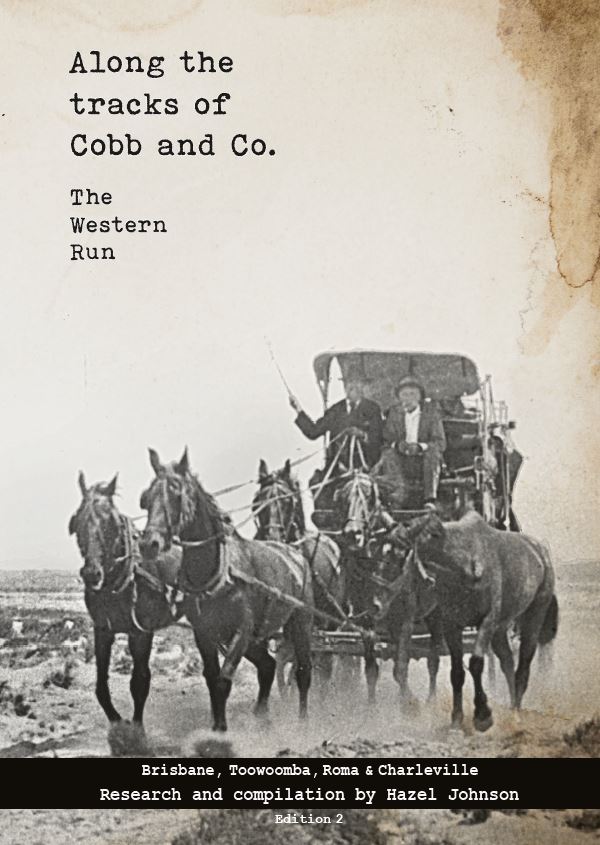Along the tracks of Cobb and Co. - The Western Run (Brisbane, Toowoomba, Roma & Charleville )
SKU:
A$27.95
A$27.95
Unavailable
per item
Edition 2 ... 148 pages ... 150+ historical photos
‘Tchk-tchk! Git-up!’ The journey continues--feel the rhythm of the swingle-bars, the steady beat of hooves, and the bounce of sturdy leather springs as Cobb and Co. charges forward into history.
Step into the golden age of Cobb and Co., where dust swirled along bush roads, the sweet scent of ferns and eucalypti lingered on the crisp morning air, and pioneers carved their legacy into the land. Some say these were better days—a time of grit, adventure, and unbreakable spirit, when coaches thundered across the nation, connecting towns, delivering mail, and carrying the hopes of a growing Australia.
Along the western run, Cobb and Co.’s bustling mail changes, lively refreshment stops, and ‘Royal Hotels’ offered weary travellers a brief respite before pushing forward into the unknown. But as railways rose, the coaching industry slowly faded, main routes were abandoned, and country towns slipped into history. Once a vital institution, Cobb and Co. became a romantic, picturesque memory, its legacy etched into the fabric of Australia’s past.
On this journey, take an extended stop in and around Roma, where the echoes of Cobb and Co. still linger near the old slab hut, whispering stories of a time long gone.
Unlike other historical accounts, this book series preserves the voices of Cobb and Co.’s era, capturing authentic writings from the 1800s to mid-1900s, allowing history to speak for itself. You won’t just read about Cobb and Co.—you’ll experience it.
"Rain, hail, or shine—mud, dust, or flood—it was all the same to Cobb’s drivers." Whether riding with wild, quiet, or barely tamed horses, the journey was never predictable. Feel the dewy breath of early morning, the anticipation of townsfolk gathering as the coach arrived, its wheels rattling over rugged tracks. But beyond the thrill lay moments of sheer terror—the chaos of bolting horses, the heart-stopping sensation of being pitched clean out of the coach, or the battle against pitiless sleet slicing like a thousand sharp-edged knives, cold, wet, and unforgiving.
Oh! Those were the days—pulsating with life, brimfull of laughter, and etched into the untamed heart of Australia.
Step into the golden age of Cobb and Co., where dust swirled along bush roads, the sweet scent of ferns and eucalypti lingered on the crisp morning air, and pioneers carved their legacy into the land. Some say these were better days—a time of grit, adventure, and unbreakable spirit, when coaches thundered across the nation, connecting towns, delivering mail, and carrying the hopes of a growing Australia.
Along the western run, Cobb and Co.’s bustling mail changes, lively refreshment stops, and ‘Royal Hotels’ offered weary travellers a brief respite before pushing forward into the unknown. But as railways rose, the coaching industry slowly faded, main routes were abandoned, and country towns slipped into history. Once a vital institution, Cobb and Co. became a romantic, picturesque memory, its legacy etched into the fabric of Australia’s past.
On this journey, take an extended stop in and around Roma, where the echoes of Cobb and Co. still linger near the old slab hut, whispering stories of a time long gone.
Unlike other historical accounts, this book series preserves the voices of Cobb and Co.’s era, capturing authentic writings from the 1800s to mid-1900s, allowing history to speak for itself. You won’t just read about Cobb and Co.—you’ll experience it.
"Rain, hail, or shine—mud, dust, or flood—it was all the same to Cobb’s drivers." Whether riding with wild, quiet, or barely tamed horses, the journey was never predictable. Feel the dewy breath of early morning, the anticipation of townsfolk gathering as the coach arrived, its wheels rattling over rugged tracks. But beyond the thrill lay moments of sheer terror—the chaos of bolting horses, the heart-stopping sensation of being pitched clean out of the coach, or the battle against pitiless sleet slicing like a thousand sharp-edged knives, cold, wet, and unforgiving.
Oh! Those were the days—pulsating with life, brimfull of laughter, and etched into the untamed heart of Australia.
Thank you for your support in keeping Australian history alive. By purchasing this book, you are helping to uncover,
preserve, and share the rich tapestry of our nation’s past—ensuring that future generations can learn from it, appreciate it,
and be inspired by the stories that shaped Australia.
Your contribution allows history to speak for itself—authentic, untold, and waiting to be rediscovered.
preserve, and share the rich tapestry of our nation’s past—ensuring that future generations can learn from it, appreciate it,
and be inspired by the stories that shaped Australia.
Your contribution allows history to speak for itself—authentic, untold, and waiting to be rediscovered.
